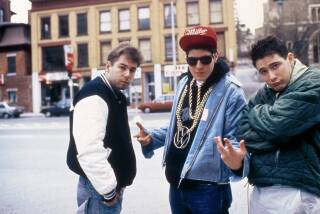Internet Upstarts Savor Victory in a Big League
- Share via
With innocent exuberance, big dreams and no sense of the legal turmoil that would follow, the three technology-savvy brothers launched their Internet advertising business five years ago.
Working out of their parents’ Yorba Linda home, they created a distinctive business plan: Buy Internet advertising space, then be paid by clients to post ads using “pop-under” technology, in which ads are displayed on an uncluttered screen after the browser is closed.
Today, the brothers Vanderhook look to be $4.3 million richer -- and jaded beyond their years about the cutthroat nature of Internet business.
And they wonder what is in store Wednesday, when the next chapter of their litigation plays out.
The brothers -- Tim, now 22; Chris, 25, and Russell, 26 -- created Advertisement Banners.com in 1999, one of a few companies that employ the “pop-under” technology. One of the first big clients they landed was X10 Wireless Technology, a Seattle electronics firm. In short order, the company’s security-camera ads were ubiquitous on the Internet, featuring women wearing little more than come-hither looks.
But then, the brothers say, X10 stiffed them the $564,000 in advertising commission that the trio was due for the July 2001 business contract, money their company needed to pay for the Internet advertising space they had bought.
Furthermore, the young men contended, X10 stole their proprietary technology and business model, and built its own Internet advertising business with some of Advertisement Banners.com’s clients.
The Vanderhooks saw not just their wide-eyed dreams dissolve but, in a larger context, say they felt betrayed by what they see as a lack of responsibility among businesses exploiting the “wild, wild Web,” as the largely unregulated medium is known.
So they sued X10.
“We wanted to go after them to make the statement that they cannot do business this way anymore,” said Chris Vanderhook.
After an 18-day trial that ended Oct. 7, a Santa Ana Superior Court jury sided with the Vanderhooks and awarded the brothers compensatory damages of $4.3 million.
On Wednesday, jurors will begin deliberating how much in punitive damages, if any, the Vanderhooks should receive.
An attorney representing X10 in the lawsuit declined to comment about the trial or the possibility of an appeal.
“It would be inappropriate for either counsel to discuss this matter until the jury has completed its deliberations,” said X10 lawyer Sean P. O’Connor.
Calls seeking comment from X10 officials were not returned.
The court success has stunned the Vanderhooks, sons of a former Los Angeles policeman. The size and experience of their legal opponent daunted the brothers throughout the process, but at no time did they consider giving up, said company President Tim Vanderhook.
“It was a wrong that needed to be righted,” he said.
A senior at Cal State Fullerton completing a degree in advertising, he said X10’s attorneys tried to confuse the jury with Internet jargon and accused the brothers of concocting lies to “shake down” the larger company.
“They just picked at everything we said and turned it into this conspiracy,” he said.
The larger company had assumed that its size and power would allow it to prevail, said the brothers’ attorneys, Michael Fitzgerald and Eric Francisconi.
“These were young guys who had a dream to start a successful company, but X10 looked at their youth and thought they could wipe them out,” Fitzgerald said.
Even as the brothers were fighting for their company’s future, enduring day after day of salty beef dip sandwiches in the courthouse cafeteria, the outside world never let them forget their youthfulness.
During the trial, Tim Vanderhook’s Internet advertising professor told him to ask the judge for a note excusing him from class. When the young men went out to celebrate their $4.3-million verdict, they were denied beers because they didn’t have their IDs.
But the lawsuit, along with their mother’s terminal illness and death as they were starting their company, have forced the three to grow up quickly, said Russell Vanderhook.
“All of a sudden it stops being a game, when it’s real money and real dollar figures and real employees depending on us for their jobs,” he said.
As the company’s suit against X10 has wended its way through the legal system for the last two years, the brothers and their seven employees have been struggling to recoup their losses.
“When we found out they weren’t paying that bill, we were beyond distraught,” Chris Vanderhook said.
But after two years, around the time the trial started, the company was back in the black and has recovered most of its previous clients. “This lawsuit was about fairness,” Chris Vanderhook said, “not about making us rich.”






